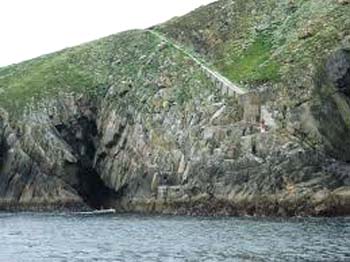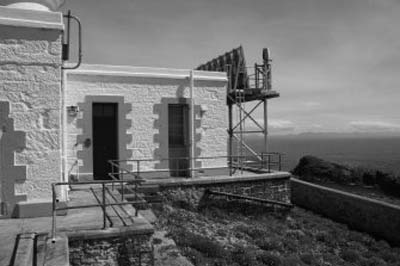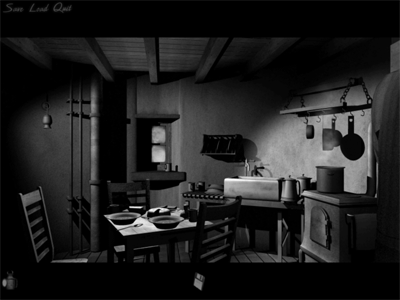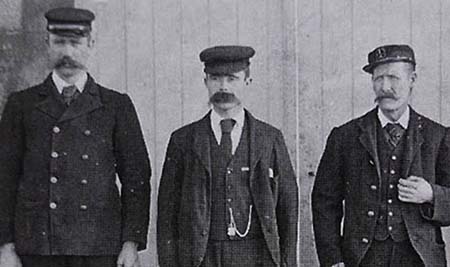This is the third of a series of four blog posts about the mysterious disappearance of the three lighthouse keepers on Flannan Isle on December 15th 1900. Here’s a link to Post No 1. And here’s a link to Post No 2.
Last time, we looked at the report by the NLB inspector, Robert Muirhead, about the mysterious disappearance of these three men. This document makes very clear his ideas about an explanation of the mystery. He thought that the men went down to the West Landing to secure equipment. They may have been at the box where the ropes and so on were kept (110 feet above sea level)….

They may even have descended to the landing stage, a very steep path with a very slippery area at the bottom…..

And then all three men were washed off by a gigantic wave…

Not everybody accepted Muirhead’s theorising about the men’s disappearance, but Wilfrid Wilson Gibson’s description in his poem, of an overturned chair and an uneaten meal on the table was quite simply wrong. presumably poetic licence. No furniture or food had been touched at all.
The very best objections come from Keith McCloskey on his website. He poses questions which emphasise apparent flaws in the most popular theory of a huge storm.
Why did they go the West Landing to secure equipment so late in the day? The daylight would have been fading as it was mid-December.
Why did they leave it so long, as the weather was getting worse, not better?
James Ducat had 22 years of experience. Would he have jeopardised his life and that of the others, to walk down to a landing that was being hammered by winds and 30ft to 40ft waves?

Keith McCloskey favours the wind as a theory. He thinks that the men left the lighthouse to investigate a strange noise or a banging door, and a powerful wind, funnelled between the side of the lighthouse and the outer wall, picked the men up and blew them over the wall and straight over the 300 foot cliff only thirty feet away on the other side of the perimeter wall.

Keith quotes an interesting story which proves how strong the wind can be in these parts……
“Former NLB Light keeper Alistair Henderson (who weighed 16 Stones – 102Kgs) was once carrying a fridge between the Lighthouse and the station buildings at Rubh’Re when the wind lifted him, while he was holding the fridge, off his feet and blew him over and he landed several feet away.”
Rubh’Re is on the mainland, to the north east of the Isle of Skye, at the entrance to Loch Ewe.
At one time, there was a theory that the log book contained evidence of one man going mad and he could have killed the other two and then himself. Later research by Mike Dash on behalf of the Fortean Times revealed that such evidence as there was was entirely forged after the event.
Theory No 36 depends on the fact that the cliffs of Flannan Isle are deeply incised with narrow gullies called “geos”. The West Landing is right next to a geo which also has a cave at the very far end. It is possible that a large volume of water could fill the geo itself, and the cave, and then “explode out again with considerable force”, as one website said, washing the men into a raging sea.
Walter Aldebert spent four years on Flannan Isle as a lighthouse keeper. His solution was an Occam’s Razor job, namely that one man may have been washed into the sea but then his companions, while trying to rescue him, were also washed away.
The remainder of the solutions definitely do not come from Occam or his razor.
A fight broke out near the edge of the cliff and the three men all fell off and died.
A ship arrived to take them away to a new life of heavy drinking and wild women:

They were abducted by foreign spies.
A sea serpent carried the men away:

A UFO carried the men away (with, apparently, one UFO for each man):

They were carried off by a boat filled with ghosts:

In actual fact, most local people believed the solution to the puzzle was supernatural. For centuries, this group of windswept islands had been called “The Seven Hunters” and they were commonly believed to be haunted by “The Phantom of the Seven Hunters”, a supernatural being who carried people off to who-knows-where. Flannan Isle was inhabited by St Flannan around 650 AD and pilgrims subsequently came to see his home, but only after removing their hats and turning 360° clockwise immediately after coming ashore. Here’s St Flannan’s little house, which would be worth £12,000,000 in the suburbs of London…….

In medieval times shepherds brought their sheep to Flannan Isle to graze in summer but none of these superstitious peasants would stay overnight. At that time there was a strong local belief that, hundreds of years before, in pre-Christian times the island was where the pagan Picts took their dead and burnt them on funeral pyres:

For these reasons, in 1899-1900, it had actually been extremely difficult to find any men among the local population, willing to serve in the brand new lighthouse on Flannan Isle.
Joseph Moore, the first man on the island after the men disappeared, reported that he had felt a very strange and eerie feeling as he walked through the deserted lighthouse. And ever since the disappearance, the island has had “an overwhelming sense of melancholy”.
Next time, the correct answer that fulfils all the conditions. Who will have won a winter break on Flannan Isle?

















